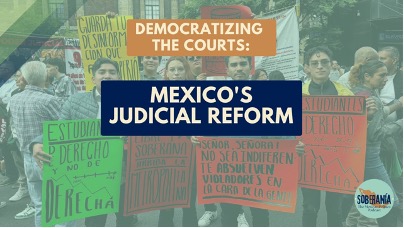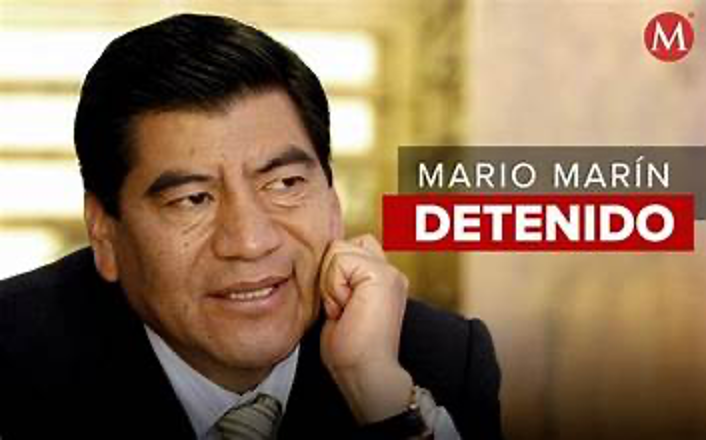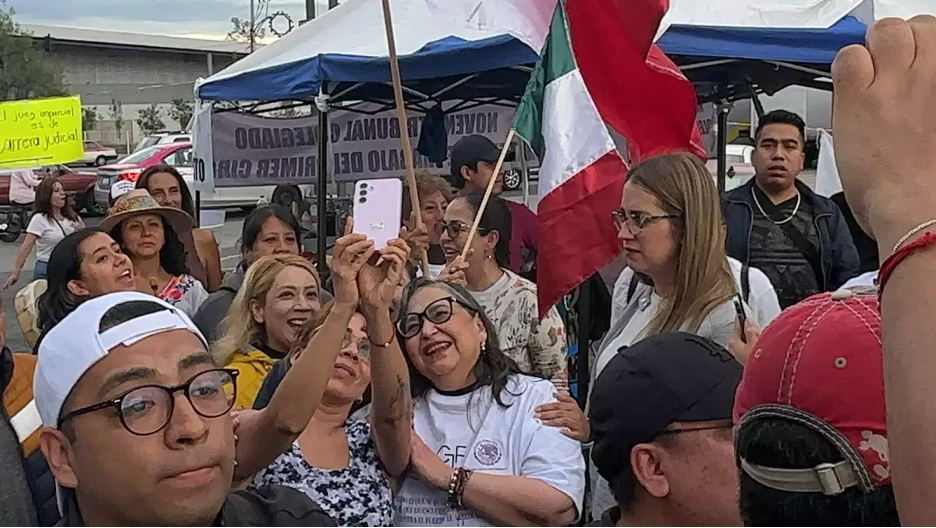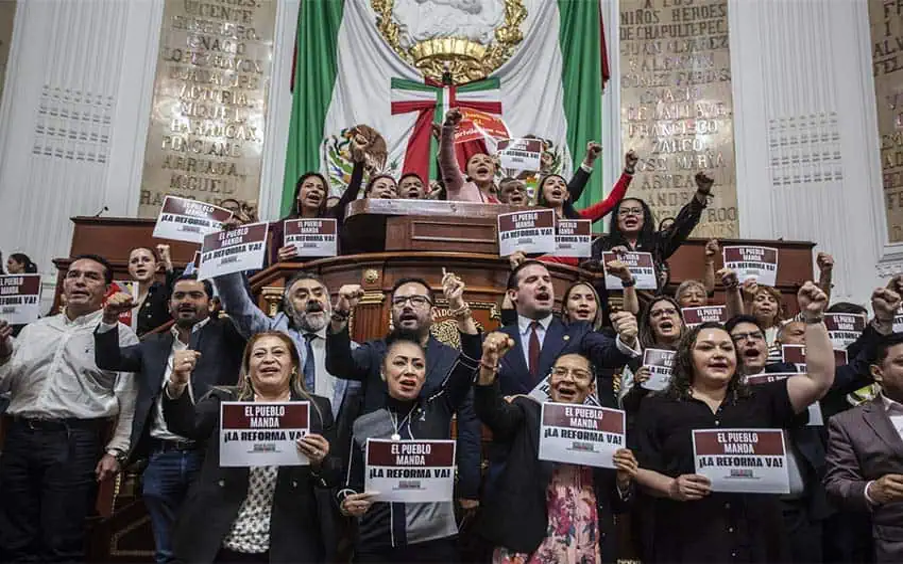|
|
The weekly newsletter of the Mexico Solidarity Project |
|
Every issue archived online at mexicosolidarityproject.org |
|
September 18, 2024 |
|
|
|
An Injudicious Act Puts US on Time-Out |
|
Meizhu Lui, for the editorial team |
|
|
Boy in a time out. Photo from Beth Ellwood; Mental Health, Social Psychology |
|
When a little kid misbehaves, a parent or teacher might sit them in the corner or put them on time-out. Hopefully, undistracted, they will contemplate what they did wrong.
A few weeks ago, US ambassador to Mexico Ken Salazar issued a public statement criticizing President Lopez Obrador’s proposal to revamp Mexico’s judicial branch. He declared that changing from appointed to elected judges would be a “major risk” to democracy, in part because it could “help cartels take advantage of inexperienced judges with political motivations.”
Even Lopez Obrador’s detractors admit the current system isn’t working. A case in point: Mexico’s former attorney general under the PRI, Jésus Murillo Karam, was implicated in the 2014 disappearance of the 43 students in Ayotzinapa. He led the investigation — actually the cover-up — that followed, and authorities finally arrested him in 2022. Obviously, cartels had penetrated the highest levels of government. Did the judiciary provide a check or balance? Just recently, Alejandro Encinas, Mexico’s undersecretary for human rights, has accused two judges of hampering the Ayotzinapa investigation by dismissing charges against suspects from a criminal organization.
The fact is, the US isn’t really concerned about cartel influence on the judiciary. So, what is its interest? It doesn’t want to lose a system that works well for US corporations, which could always find a bribable judge who’d permit them to exploit Mexico’s resources. That’s why Ambassador Salazar was alarmed; the reform could upset “the historic commercial relationship” between Mexico and the US — that is, the historic cozy relationship between the PRI government and US business.
Salazar’s public statement was a toy gun pointed at the president, and it didn’t scare AMLO. He put the US oil lobbyist cum ambassador into the time-out corner by announcing that the relationship to the US embassy was “on pause.” Almost immediately, Salazar blinked: he admitted he’d gone too far and said that the US was open to dialogue. AMLO immediately put him back on time-out. No dialogue! This is none of your damn business! “As long as I am here, I will not allow any violation of our sovereignty.”
It’s clear that AMLO is the adult in the room.
|
|
For a deeper dive into current news and analysis in English, check out our media website. And definitely see the new English podcast ¡Soberanía! (Sovereignty) with José Luis Granados Ceja and Kurt Hackbarth. They entertain, while dismantling the lies and distortions about Mexico fed to us by the mainstream media. |
|
Don’t miss an issue! Sign up for a free Mexico Solidarity Bulletin subscription. |
|
|
Who’s Entitled to Judge the Judges? |
|
José Luis Granados Ceja and Kurt Hackbarth, beyond all their other myriad accomplishments as independent journalists, regularly puncture fake news on the Mexico Solidarity Project’s popular Soberanía podcast. It’s the only English language program that gives you everything you wanted to know about Mexico but didn’t know what to ask! Find more in the linked episode — and don’t miss a week! |
|
|
|
On September 11, Mexico passed a sweeping constitutional judicial reform. We hear ad nauseam about how the US and the Mexican opposition view the changes. But what about the Mexican people?
José Luis Granados Ceja: The people of Mexico hate the judicial system. Thousands of Mexicans, without adequate connections or bank balances to pay mounting legal costs, languish for years on end in prison before their cases ever come to trial. Women see their accusations of abuse discounted and stop bothering to try for justice. For far too long, the system has failed to deliver justice to ordinary citizens, particularly the poor. And remember that president López Obrador’s pledge is “for the good of all, but first, the poor.”
The government presented these reform proposals in public assemblies, and they were discussed for almost a year. People overwhelmingly said, “Do it!” President Lopez Obrador (AMLO) talked about his proposals publicly, and Claudia Sheinbaum publicly supported them. In June, the Mexican people elected Claudia with twice as many votes for her as her opponent and gave both houses of the new legislature the two-thirds majority needed to change the Constitution. It was an undeniably popular mandate to replace the entire corrupt judicial system.
Kurt Hackbarth: What really stuck in people’s craw was that the current system works all too well for the wealthy elite. The system forgives their tax debts, and, if they are suspects, they seem to have “get-out-of-jail-free” cards. It’s common knowledge that judges free wealthy politically connected criminals on Saturdays when the media coverage is less and government offices are closed. People even gave a name to the practice — the sabadazo! During AMLO’s term (prior to any reforms), the system freed 192 people, including the ilk of Mario Marin, the former governor of Puebla, who was implicated in a child porn ring, and who ordered the torture of the journalist who broke the story. A macabre sport in Mexico has been waiting to see which new well-heeled individual will be sent through the revolving door.
And nepotism is rife. In 2022, 6,755 family networks related to members of the judiciary were documented. One family had 70 members! A typical scenario: a Supreme Court judge’s daughter who studied dentistry got a high level job in the Court. And the opposition complains that the reforms will get rid of professionalism? Getting a judgeship is a family employment plan! If you wonder about those poor judiciary workers demonstrating against the reform, remember the way many of them got their jobs — 89% are direct appointments. |
|
|
The ex-governor of Puebla, Mario Marín, detained. Photo: Rocío Vázquez |
|
What are the Supreme Court justices paid? $30,000 US dollars a month plus other bennies. Up to a million pesos — or $50,000 dollars — as food allowance. You can buy a house for that amount! |
|
So how will the Constitutional reform fix the problems?
Kurt: For the Supreme Court, the reforms will cut the number of justices from 11 to 9; their terms will be 12 years instead of 15. Rather than a small number of judges having closed-door and off-the-record discussions in separate rooms and privately reaching decisions, everything must now be debated by the full court and in public.
The big reform will be direct elections of all federal and state judges by popular vote, organized by the National Electoral Institute (INE). It’s been charged that private interests — such as cartels — can buy a judge. But NO public or private campaign financing will be allowed; instead, candidates, vetted by a commission, will get free air time to present themselves.
No one is being fired. The current judges are free to run. Their opposition to reforms only shows they know they’re too unpopular with ordinary people to win.
José Luis: Rather than strengthening the president and making him a dictator, as critics have charged, electing judges actually takes away presidential power. Before, the president often directly appointed Supreme Court justices. Now, the power is given to the people.
Another part of the reform created an independent disciplinary commission empowered to investigate — and sanction — judges. Currently, the Supreme Court is a boy’s club. It investigates itself, operating much like the Catholic Church when it investigated priests for sexual abuse. The US Supreme Court could use such a commission! Maybe on-the-take justices like Clarence Thomas and Samuel Alito would actually get brought to justice. |
|
Further, trials can no longer continue for more than a year. Delaying trials often leaves ordinary suspects in jail. But postponement helps the wealthy in corruption or tax evasion cases — postpone, postpone until the statute of limitations kicks in and they can walk away. The class bias of the judiciary system is very clear. |
|
|
A Mexico prison; lack of personnel causes prison problems |
|
Why a constitutional change? Does AMLO want total authority in the executive branch — like Trump and other dictators — as has been charged in the media? Is this a setback to democracy?
José Luis: During AMLO’s six years, the Supreme Court invalidated 74 laws passed by his administration and the Congress. Thus, they undermined the new administration’s ability to carry out its agenda and undemocratically subverted the will of the people who elected AMLO and those representatives. How did they do that? Frequently, through the use of the amparo, a unique Constitutional mechanism. It allows an individual to file an injunction to stop the state from violating their rights before it happens.
It has positive uses — like for a community that wants to stop a mining project — but corporate bigwigs have also abused it. They know which judges to tap who will issue an amparo that promotes their profiteering interests over those of the state. Related to this judicial reform, two judges asked two other judges to issue an amparo to stop the legislators from even discussing the proposal! Two people tried to stop a reform supported by 37 million Mexicans hoping to end judicial impunity.
Only a Constitutional reform can stop this kind of abuse by judicial authorities.
So will electing judges make the system more partisan?
Kurt: Appointed judges are hardly impartial — witness the Trump Supreme Court! And the Mexican Supreme Court! Just one instance — before the June election, the Chief Justice, Norma Piña, had a clearly partisan private meeting with magistrates from the Federal Electoral Tribunal who would soon certify the 2024 election, together with Alejandro Moreno, the president of the opposition Institutional Revolutionary Party (PRI), whom she introduced as her friend. |
|
Recently, she showed up at a protest against the reform — also a blatantly inappropriate partisan act. |
|
|
Norma Piña joined the opposition demonstration in Mexico City. Photo: Especial |
|
The Supreme Court has a few more months for dirty tricks. They claim they are defending the Constitution. But the Constitution lays out how to amend it — and this reform proposal followed the process to the letter. The judiciary is running out of tricks and out of time. |
|
|
Mexico City lawmakers celebrating their legislature's ratification of President López Obrador's judicial reform bill after it passed in the federal Congress. (Andrea Murcia Monsivaís/Cuartoscuro) Mexico News Daily |
|
Reform of the judiciary is a capstone AMLO accomplishment. At last, the Mexican people can expect justice. |
|
|
|
|
Judicial Reform Will Benefit Women |
|
|
We’re pleased to feature a guest Reflection from lawyer Gabriela Diaz Salinas. She served as director of the Equality Division at the Mexican Social Security Institute (a government program assisting with public health, pensions and social security) and also served within the Supreme Court’s General Directorate of Human Rights. |
|
In Mexico, the justice system has deeply failed women. Just look at cases where judges have released men who have assaulted women and girls or reclassified their crimes to ones less severe, reflecting their long bias against women. We also know that sexual harassment occurs within the judiciary itself and creates structural disadvantages for the women working there.
For these reasons, Mexican women support the judicial reform proposed by President Lopez Obrador. We hope now that more women — feminists! — will become decision-makers in the administration of justice.
Numerous attempts to instill a better gender perspective in the judiciary have fallen short. It requires a complete overhaul. To incorporate new ideals of justice more aligned with people’s lives requires electing judges — massively and democratically — with different profiles. These reforms will not automatically assure positive changes for women and other disadvantaged groups in our society, but they will increase public scrutiny of judges. Naturally, as a consequence, our social expectations for judges will rise.
Through the reform, more women will be able to attain positions in the judiciary — breaking a glass ceiling unbroken for years and years. Although we currently have a woman as Chief Justice of the Supreme Court for the first time ever, it has not resulted in more justice for women or in real parity and access for women to these positions.
Judicial reform will be a radical democratic equalizer, breaking the myth of meritocracy within Mexico’s judiciary. |
|
|
|
|
Recent news reports and commentaries, from progressive and mainstream media, |
|
Energy Unions Welcome Shutdown of Key Neoliberal Institutions Trade Unions for Energy & Democracy. “The disappearance of the CRE represents a hard blow to the neoliberals and their privatization policies. There will be no turning back despite their now futile legal challenges, despite the scandalous media criticism from corporations and international capitalists who lament the end of the plundering of our country,” said the Foreign Affairs Secretary of the Mexican Electrical Workers' Union.
Zhang Run, China- México: excluir el “ruido de terceros” La Jornada. Recientemente, instituciones y personajes de Estados Unidos han desacreditado el sistema económico chino con fines políticos, afirmando falsamente que las inversiones chinas en México son “preocupantes” y pueden complicar la primera re visión sexenal del T-MEC.
Pablo Meriguet, Mexico’s Senate approves Judicial Reform People’s Dispatch. Claudia Sheinbaum: “With the election of judges, magistrates, and ministers, the administration of justice in our country will be strengthened. The regime of corruption and privilege is becoming a thing of the past and a true democracy and rule of law will be built. “Demos” means people, “krátos” power. The power of the people.”
Kurt Hackbarth, ¿Quién le teme a la democracia mexicana? Jacobin. El Poder Judicial mexicano es conocido por favorecer a los oligarcas y otros intereses deshonestos. Las reformas judiciales de MORENA buscan reparar esto mediante elecciones democráticas, propuesta que genera pánico a las élites empresariales.
Tim Young, How Mexico crushed neoliberalism and the right Morning Star. Labour Friends of Progressive Latin America’s TIM YOUNG looks at Morena’s landslide, where rolling back privatization, boosting welfare and reclaiming national resources has transformed the country and rallied huge support.
Alberto Schneider, Sociedad civil, revoluciones de colores y golpes blandos Revolución. Como en otra veintena de países, incluido los Estados Unidos, que ya la tienen, urge en México una legislación que regule la operación de estas agencias de intervención política extranjera. Siempre han sido el ariete, el caballo de Troya, del intervencionismo “blando” para debilitar soberanías, socavar gobiernos y, en su caso, derrocarlos.
Elia Castillo Jiménez, Mexico’s judicial reform: The win for López Obrador that’s mortally wounded the opposition El País. After this latest thrashing, will the money-laundering and patronage institutions masquerading as political parties continue to stumble zombie-like across the landscape of Mexico, bereft of popular support, or double-down on their ultra-right tendencies and beg for more USAID dollars and Spanish political guidance?
Lorenzo Meyer, El Mesías tropical venció El Universal. El juicio que se haga en el futuro en torno al papel que jugó el líder tabasqueño en el proceso político de México en el siglo XXI va a depender de muchos factores —ideología del evaluador, circunstancias en que tenga lugar la evaluación, etcétera— pero poca duda cabe que en cualquier caso se reconocerá lo indeleble de su huella, la naturaleza de los cambios que propició y la sacudida que le dio al status quo político, social y cultural. Pero la importancia y dimensiones del lopezobradorismo en el futuro no van a depender sólo de lo hecho por el político tabasqueño sino también de la manera en que sus sucesores aprovechen (o desaprovechen) su legado.
Judicial Reform Strengthens Justice in Mexico: President-Elect Claudia Sheinbaum Telesur English.With 86 votes in favor and 41 against, the Senate approved the constitutional reform initiative presented by President Andres Manuel Lopez Obrador (AMLO).
Mariana Bermúdez, Mujeres indígenas, ejemplo de resistencia [English] La Jornada. Después de tanto despojo de recursos, criminalización, y ahora con una mujer como representante del Poder Ejecutivo federal, es importante analizar cuáles serán las narrativas de la próxima mandataria y sus líneas de actuación hacia las poblaciones indígenas para contrarrestar las desigualdades, principalmente las que afectan a las mujeres indígenas, qué enfoque usar y cómo ello abonará a fortalecer sus liderazgos. |
|
|
|
|
The Mexico Solidarity Project brings together activists from various socialist and left organizations and individuals committed to worker and global justice. We see the 2018 election of Andrés Manuel López Obrador as president of Mexico as a watershed moment. AMLO and his progressive Morena party aim to end generations of corruption, impoverishment, and subservience to US interests. Our Project supports not just Morena, but all Mexicans struggling for basic rights, and opposes US efforts to undermine organizing and Mexico’s national sovereignty.
Editorial committee: Meizhu Lui, Bruce Hobson, Agatha Hinman, Victoria Hamlin, Courtney Childs. To give feedback or get involved yourself, please email us! |
|
Subscribe! Get the Mexico Solidarity Bulletin in your email box every week. |
|
Web page and application support for the Mexico Solidarity Project from NOVA Web Development, a democratically run, worker-owned and operated cooperative focused on developing free software tools for progressive organizations. |












